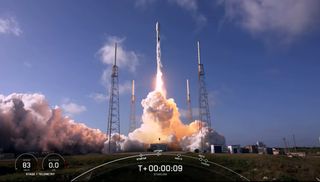
Investors eagerly awaiting the initial public offering (IPO) of SpaceX's Starlink satellite-internet business will have to cool their heels for a while.
SpaceX founder and CEO Elon Musk said the company likely won't take its Starlink branch public for another three to four years, CNBC reported today (June 7), citing a presentation that the billionaire entrepreneur gave to SpaceX employees at an "all hands" meeting last week.
Starlink needs to be "in a smooth-sailing situation" with "good predictability," Musk said during the meeting, according to an audio recording of the event obtained by CNBC. When that is the case, he added, "I think spinning it off as a public company can make a lot of sense."
Related: SpaceX's Starlink megaconstellation launches in photos
Any such move would be a big deal for investors and for SpaceX, which remains a privately traded company. (Musk's other key company, Tesla, went public in 2010.)
Starlink's IPO has been three to four years away before; Musk gave a similar estimate in an email he sent to SpaceX employees in 2019, before backing away from that timeline in a 2021 tweet, CNBC noted.
SpaceX sees Starlink as crucial to the company's long-term goals. For example, Musk has said that revenue generated by the satellite-internet constellation will help SpaceX develop Starship, the giant vehicle designed to enable humanity to settle Mars and achieve a variety of other ambitious exploration feats.
Get the Space.com Newsletter
Breaking space news, the latest updates on rocket launches, skywatching events and more!
The dependence is mutual, for Starship is vital to Starlink's future as well. The next-gen version of Starlink satellite will be much more massive than the current iteration — so hefty, Musk recently said, that Starship will be the only vehicle capable of launching batches of them to orbit.
SpaceX has launched more than 2,600 Starlink satellites to date, and the network is providing broadband service to more than 400,000 subscribers around the world. But Starlink will get much bigger yet, if all goes according to plan; the next-gen version of the constellation could consist of up to 30,000 satellites.
Mike Wall is the author of "Out There" (Grand Central Publishing, 2018; illustrated by Karl Tate), a book about the search for alien life. Follow him on Twitter @michaeldwall. Follow us on Twitter @Spacedotcom or on Facebook.
Join our Space Forums to keep talking space on the latest missions, night sky and more! And if you have a news tip, correction or comment, let us know at: community@space.com.

Michael Wall is a Senior Space Writer with Space.com and joined the team in 2010. He primarily covers exoplanets, spaceflight and military space, but has been known to dabble in the space art beat. His book about the search for alien life, "Out There," was published on Nov. 13, 2018. Before becoming a science writer, Michael worked as a herpetologist and wildlife biologist. He has a Ph.D. in evolutionary biology from the University of Sydney, Australia, a bachelor's degree from the University of Arizona, and a graduate certificate in science writing from the University of California, Santa Cruz. To find out what his latest project is, you can follow Michael on Twitter.
